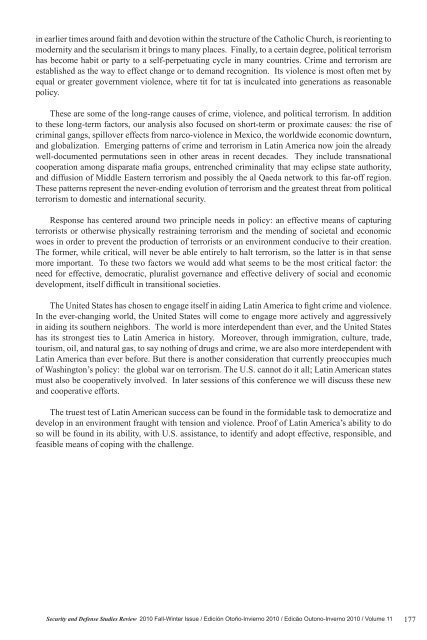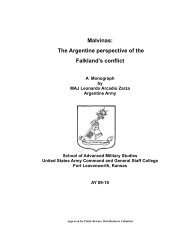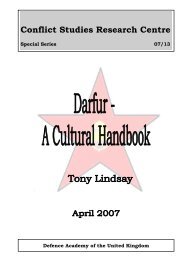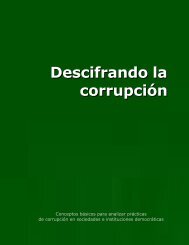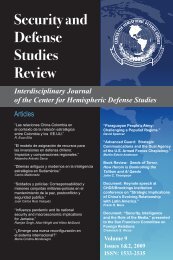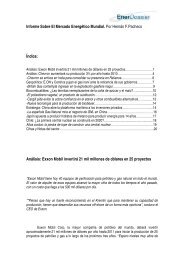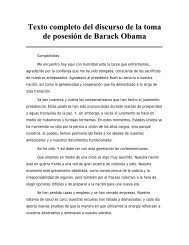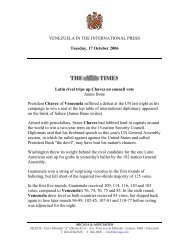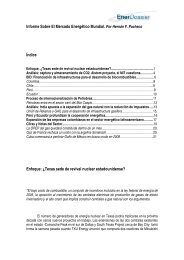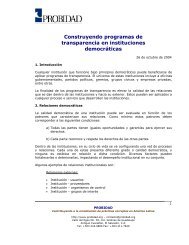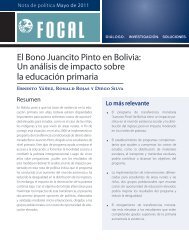country” like North Korea. To be or not be a part of globalization is no longer an issue; the onlyquestion is whether a country is in a position to take advantage of globalization or not.Here again, Mexico <strong>and</strong> the small countries of Central America are particularly vulnerable. First,<strong>and</strong> unlike most of the South American countries, they are tied in closely with the U.S. economy so,when the U.S. economy suffers recession, Mexico <strong>and</strong> Central America also suffer—often worse—because their economies are not so diversified as that of the U.S. Never has the old adage, nowapplicable to both Mexico <strong>and</strong> Central America, been truer: “when the U.S. sneezes, Mexico [<strong>and</strong>Central America] get pneumonia.”Second, while we usually think of globalization as primarily economic, globalization also hascultural, political, military, social, <strong>and</strong> technological aspects to it. In the present circumstances,what is particularly worrisome is the globalization of crime, violence, gangs, guns, narco-trafficking,<strong>and</strong> mafias. That is one of the unfortunate side-effects of globalization, which otherwise can beadvantageous. Sadly, it is almost as difficult to reverse the violent <strong>and</strong> criminal aspects of globalizationas it is to hold back the tides of globalization in general.ConclusionCrime <strong>and</strong> political terrorism constitute grave threats to the democratization as well as the developmentprocess in Latin America. While they do not have the power or momentum in most countries to derailthe process entirely or to overthrow governments, fighting crime, violence, <strong>and</strong> terrorism drainsresources <strong>and</strong> strains government relations within communities as well as causes war wearinessamong the people. It adds to the divisions <strong>and</strong> tensions of already deeply divided countries. Suchtensions tugging at democratization are contributing to the decline of its appeal to Latin Americansgenerally. Specifically, dissatisfaction may be slowing progress by manifesting itself in frequentadministration overturns, interrupting policy continuity, diminishing government effectiveness <strong>and</strong>ability to deliver social <strong>and</strong> economic policies, <strong>and</strong> alienating people from a political system basedon enfranchisement <strong>and</strong> participation, especially in its earliest stages.Clearly, political terrorism is sufficiently threatening to already fragile societies <strong>and</strong> governmentsto more than justify prioritizing it in policy <strong>and</strong> practice. Current policy has focused, though obliquelyat times, on rehabilitating societies <strong>and</strong> economies by increasing people’s levels of social <strong>and</strong> hum<strong>and</strong>evelopment. Policy has also been hampered by debates surrounding the identification of optimalmilitary <strong>and</strong> police measures to eliminate terrorists <strong>and</strong> their accomplices. While the answer tothis question is important, it could unduly focus governments on counterterrorism measures that areincomplete <strong>and</strong> thus doomed for failure because they do not holistically remedy the actual causesof political terrorism as indicated earlier in this presentation. The problems are social, economic,political, <strong>and</strong> cultural—not just law enforcement.While there are several key variables within these societies that contribute to the rise of crime<strong>and</strong> political terrorism in Latin America, societies in transition are by definition at the threshold.Unfortunately, change in Latin America most often equates to weak <strong>and</strong> unstable governments<strong>and</strong> weak <strong>and</strong> unstable transitions to democracy. There is class conflict, creating nearly irreparablecleavages in some cases. These cleavages are based most frequently on the failure of governmentsto deliver meaningful <strong>and</strong> substantial economic <strong>and</strong> social reform, often needed to redress egregiouspower <strong>and</strong> income inequalities.History has played a role by delivering larger-than-life liberators into societies colored bymachismo <strong>and</strong> a political culture that sometimes idolizes freedom fighters. Scarce resourcesfor development <strong>and</strong> their unequal distribution provide a catalyst for the volatile face-off of theimpoverished, marginalized, or greedy against the ownership class (government or otherwise), whoare the economic as well as the political elite. Traditional society <strong>and</strong> ways of life, centered so strongly176<strong>Security</strong> <strong>and</strong> <strong>Defense</strong> <strong>Studies</strong> <strong>Review</strong> <strong>2010</strong> <strong>Fall</strong>-Winter Issue / Edicíón Otoño-Invierno <strong>2010</strong> / Edicão Outono-Inverno <strong>2010</strong> / Volume 11
in earlier times around faith <strong>and</strong> devotion within the structure of the Catholic Church, is reorienting tomodernity <strong>and</strong> the secularism it brings to many places. Finally, to a certain degree, political terrorismhas become habit or party to a self-perpetuating cycle in many countries. Crime <strong>and</strong> terrorism areestablished as the way to effect change or to dem<strong>and</strong> recognition. Its violence is most often met byequal or greater government violence, where tit for tat is inculcated into generations as reasonablepolicy.These are some of the long-range causes of crime, violence, <strong>and</strong> political terrorism. In additionto these long-term factors, our analysis also focused on short-term or proximate causes: the rise ofcriminal gangs, spillover effects from narco-violence in Mexico, the worldwide economic downturn,<strong>and</strong> globalization. Emerging patterns of crime <strong>and</strong> terrorism in Latin America now join the alreadywell-documented permutations seen in other areas in recent decades. They include transnationalcooperation among disparate mafia groups, entrenched criminality that may eclipse state authority,<strong>and</strong> diffusion of Middle Eastern terrorism <strong>and</strong> possibly the al Qaeda network to this far-off region.These patterns represent the never-ending evolution of terrorism <strong>and</strong> the greatest threat from politicalterrorism to domestic <strong>and</strong> international security.Response has centered around two principle needs in policy: an effective means of capturingterrorists or otherwise physically restraining terrorism <strong>and</strong> the mending of societal <strong>and</strong> economicwoes in order to prevent the production of terrorists or an environment conducive to their creation.The former, while critical, will never be able entirely to halt terrorism, so the latter is in that sensemore important. To these two factors we would add what seems to be the most critical factor: theneed for effective, democratic, pluralist governance <strong>and</strong> effective delivery of social <strong>and</strong> economicdevelopment, itself difficult in transitional societies.The United States has chosen to engage itself in aiding Latin America to fight crime <strong>and</strong> violence.In the ever-changing world, the United States will come to engage more actively <strong>and</strong> aggressivelyin aiding its southern neighbors. The world is more interdependent than ever, <strong>and</strong> the United Stateshas its strongest ties to Latin America in history. Moreover, through immigration, culture, trade,tourism, oil, <strong>and</strong> natural gas, to say nothing of drugs <strong>and</strong> crime, we are also more interdependent withLatin America than ever before. But there is another consideration that currently preoccupies muchof Washington’s policy: the global war on terrorism. The U.S. cannot do it all; Latin American statesmust also be cooperatively involved. In later sessions of this conference we will discuss these new<strong>and</strong> cooperative efforts.The truest test of Latin American success can be found in the formidable task to democratize <strong>and</strong>develop in an environment fraught with tension <strong>and</strong> violence. Proof of Latin America’s ability to doso will be found in its ability, with U.S. assistance, to identify <strong>and</strong> adopt effective, responsible, <strong>and</strong>feasible means of coping with the challenge.<strong>Security</strong> <strong>and</strong> <strong>Defense</strong> <strong>Studies</strong> <strong>Review</strong> <strong>2010</strong> <strong>Fall</strong>-Winter Issue / Edicíón Otoño-Invierno <strong>2010</strong> / Edicão Outono-Inverno <strong>2010</strong> / Volume 11 177
- Page 2 and 3:
Security and Defense Studies Review
- Page 4 and 5:
CommentariesSecurity Cooperation Be
- Page 6:
6Security and Defense Studies Revie
- Page 9 and 10:
El espacio de las mujeres en las Fu
- Page 11 and 12:
La organización e institucionaliza
- Page 14 and 15:
encuentra altamente asociada al cam
- Page 16 and 17:
ministerial para la equidad de gén
- Page 19 and 20:
BibliografíaBarrancos, Dora (2007)
- Page 21 and 22:
Anexo IPaísIncorporación Femenina
- Page 23:
Anexo IIMujeres militares sudameric
- Page 26:
Todo un conjunto de cualidades, cap
- Page 29:
500 y durante la Batalla de Sarand
- Page 32 and 33:
miembros de la soberanía de la Nac
- Page 34 and 35:
10 de octubre de ese año, la Compa
- Page 36 and 37:
algunos barcos de apoyo para alberg
- Page 38 and 39:
1.75 metros de altura y como requis
- Page 40 and 41:
de producción sustituyendo al homb
- Page 42 and 43:
y sicológica, no sólo en los ámb
- Page 44 and 45:
La segunda etapa se caracterizó po
- Page 46 and 47:
Sin embargo, las preguntas acerca d
- Page 48 and 49:
La normativa vinculada con la asign
- Page 50 and 51:
conductas que pudieran encuadrarse
- Page 52 and 53:
Género en el marco de las Operacio
- Page 54 and 55:
ecordar que las ciencias sociales y
- Page 56 and 57:
56Security and Defense Studies Revi
- Page 58 and 59:
De ese modo nos encontramos con mod
- Page 60 and 61:
escala descendente de la oficialida
- Page 62 and 63:
del total. Debe destacarse que dent
- Page 64 and 65:
BibliografíaCarreiras, H.: Gender
- Page 66 and 67:
Tras la aprobación de esta histór
- Page 68 and 69:
Una vez aprobada la Resolución 132
- Page 70 and 71:
para designar asesores de género e
- Page 73 and 74:
firme se ha materializado en la ado
- Page 76 and 77:
la construcción de la paz, la reco
- Page 78 and 79:
Sin embargo, a medida que avanzaba
- Page 81 and 82:
Women on the Front Lines of the Fig
- Page 83 and 84:
term even has meaning any longer wi
- Page 85 and 86:
following graduation. 15 Of course,
- Page 87 and 88:
including members from other Americ
- Page 89 and 90:
Solidariedade ou interesse? O que l
- Page 91 and 92:
em mais amplo e complexo. 7A possib
- Page 93 and 94:
Participação dos Estados-Membros
- Page 95:
sujeitos a alguma OMP. Aqueles que,
- Page 98 and 99:
às recomendações das Fases II, I
- Page 100 and 101:
Franco, que assumira após o Impeac
- Page 102 and 103:
O Brasil, por intermédio do Presid
- Page 104 and 105:
No entanto, no tocante especificame
- Page 106 and 107:
Portanto, não se consegue visualiz
- Page 108 and 109:
ReferênciasAlmeida Pinto, J.R. de;
- Page 110 and 111:
______. United Nations Department o
- Page 112 and 113:
Beyond economic activities, the PRC
- Page 114 and 115:
soy oil into the country, a flow wh
- Page 116 and 117:
As is the case with Chinese investm
- Page 118 and 119:
In some cases, Chinese companies, l
- Page 120 and 121:
Although it is not possible to pred
- Page 122 and 123:
Considering this, we will now go fr
- Page 124 and 125:
The contribution of Chilean troops
- Page 126 and 127: within and outside the nation?3. Ho
- Page 128 and 129: 128Security and Defense Studies Rev
- Page 130 and 131: 130Security and Defense Studies Rev
- Page 132 and 133: the Iran-Contra affair, one of the
- Page 134 and 135: all American hostages were released
- Page 136 and 137: “As he frequently said with pride
- Page 138 and 139: making operation 48 was conducted s
- Page 140 and 141: secret army alongside skilled profi
- Page 142 and 143: public than Kelly, taking issue wit
- Page 144 and 145: Some conservatives, even within the
- Page 146 and 147: opponents that he was “getting pr
- Page 148 and 149: for Defense (SUBDEF)—could initia
- Page 150 and 151: Hence, our countries are showing a
- Page 152 and 153: I am referring to Ibero-American Su
- Page 154 and 155: Thus, our country has agreed to the
- Page 156 and 157: sustraer mi producción intelectual
- Page 158 and 159: hombres (22,288).• Inclusión. Al
- Page 160 and 161: La perspectiva de trabajar en el di
- Page 162 and 163: 162Security and Defense Studies Rev
- Page 164 and 165: assignment on the U.S. Secretary of
- Page 166 and 167: las Operaciones de Paz se abren a u
- Page 168 and 169: ConclusiónA modo de conclusión, u
- Page 170 and 171: 170Security and Defense Studies Rev
- Page 172 and 173: offering insight into political ter
- Page 174 and 175: goods, and skilled labor must all b
- Page 178 and 179: 178Security and Defense Studies Rev
- Page 180 and 181: views of women, in effect disabling
- Page 182 and 183: Marine Col. William T. Hewes’ arg
- Page 184 and 185: 19. Hughes, Melanie M. (2007) “Un
- Page 186 and 187: MacEoin. Commonweal 14: 8-11.This i
- Page 188 and 189: 37. Sans Echaìniz, María. (1992)
- Page 190 and 191: 47. Woodward, Rachel, and Patricia
- Page 192 and 193: elucidativos das dificuldades que e
- Page 194 and 195: 194Security and Defense Studies Rev
- Page 196 and 197: of an integrated Canadian company i
- Page 198 and 199: 198Security and Defense Studies Rev
- Page 200 and 201: stated it would rightfully infringe
- Page 202 and 203: First, through an examination of de
- Page 204 and 205: 204Security and Defense Studies Rev
- Page 206 and 207: impact on the reader, by acknowledg
- Page 208 and 209: To the Editor:Kevin P. Newmeyer’s
- Page 210 and 211: Whitney Hoft was a Center for Hemis
- Page 212 and 213: The transformation of the role of w
- Page 214 and 215: en Puerto Rico, esta soldada resume
- Page 216 and 217: Deconstruyendo a Ollie: Cómo los c
- Page 218: Center for Hemispheric Defense Stud


